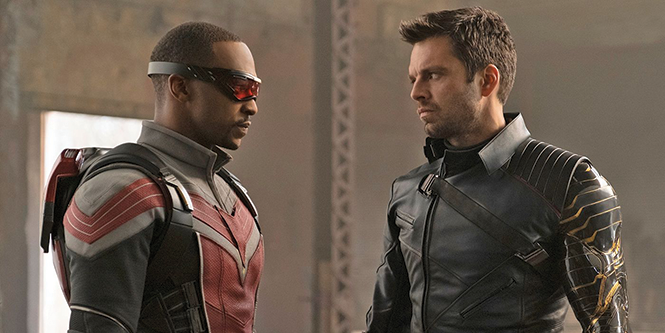
- Marvel Studios
We're more than halfway through our second Marvel TV series. The Falcon and the Winter Soldier have taken over for WandaVision as the regular offering from Disney+ to sate those of us interested in the Marvel Cinematic Universe who are craving new content. Especially since we didn't really get the new movies we'd hoped for last year, thanks to a bungled response to the pandemic from our elected officials. After we finish the current series, we've got Loki to look forward to soon after that. Then we'll get a series for Ms. Marvel (not to be confused with Captain Marvel), She-Hulk, Moon Knight, Secret Invasion, Ironheart, and more.
But there's been a debate brewing about whether or not Disney's week-to-week rollout is working. Some want to know why they can't just binge it all at once, similar to how Netflix drops shows. I have to say that the week-to-week rollout is proving to be a winner based on how successful the shows are and how long-lasting the conversations about them are.
WandaVision and The Falcon and the Winter Soldier have been breaking records for Disney+. You can't go anywhere without having to dodge spoilers for the shows if you're behind an episode. When it was revealed on WandaVision that (spoiler!) Agnes was really an obscure Marvel witch named Agatha Harkness, the theme song from the show used to reveal that information rocketed to the top of the iTunes charts, and it was all anyone online seemed to talk about for the whole week.
The thing I love most about the week-to-week rollout is that it replicates the feeling of reading comic books. As the Marvel Cinematic Universe has grown, it's come together brick by brick into a cohesive foundation that enables characters to cross over into each other's movies. That allows them to have huge combined events, just like a comic book series.
When Marvel has these huge crossover events, it's not always necessary to have read all of the small books that bring the characters into an event. The main event will catch people up easily enough. I think that's the purpose these particular shows serve. They can throw context into the big event films to catch up anyone who missed the Disney+ series and then just move on from there at a breathless pace. This isn't new—it's how Marvel has been operating for decades—and it suits the stories. Characters have more room to breathe and grow when they're no longer confined to a two-hour movie.
When I owned a comic book store, I looked forward to the month-to-month conversations when a comic book captured the imagination of my clientele. Not only would I get engaged in these lively discussions with customers, but they would interact with each other, talking about their theories from week to week or month to month.
Thanks to the internet and social media, the same thing happens now with the release pattern of the Marvel shows. We're able to debate theories and wonder how things will play out as we're all on a level playing field. And there's a high level of anticipation for the next episode to see if our ideas were on the mark. My only problem is when I see people put too much stock into their theories and then get indignant when their notions don't pan out. That sort of energy isn't good for anyone.
Personally, I hope we don't go back to the binge model for TV and that Marvel sticks around on TV to complement to their movies for a long time. There's something so fun about stewing on a piece of a story one week at a time.
Now if we can only convince Netflix to do that with the next season of Stranger Things, and we'd be in business.